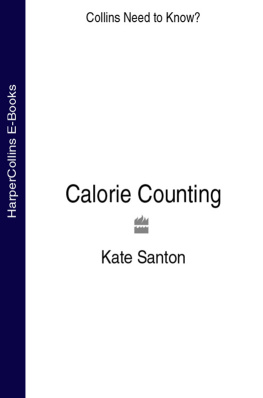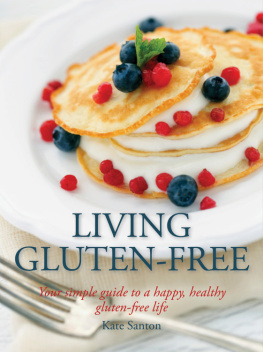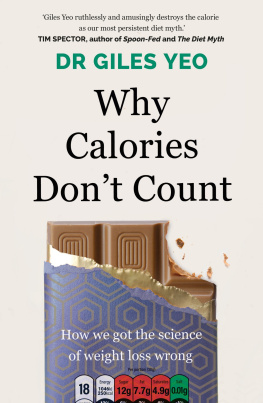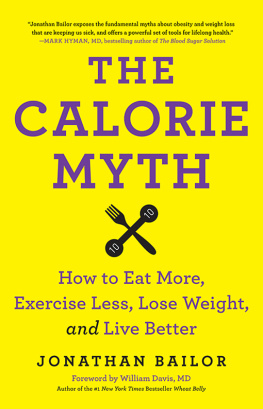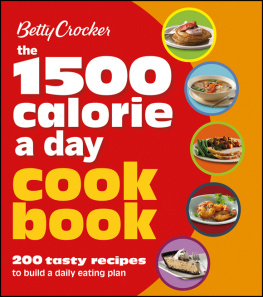
Contents

Sometimes it seems as though every day brings another diet. They are all supposed to be effective, and they are all supposed to be easy. The fact is, however, that many are neither. When it comes down to it, theres only one sure way to lose weight and keep it off: eat less and do more. Its all down to calories.
Calories are a simple measure of energy; like all living things, and like machines, we need energy to function. Breathing, moving about, digesting food bodily processes are all dependent on energy, and that energy comes from the food and drink we consume. Most diets restrict calories in some shape or form, whether they are sensible, balanced diets or fad diets that focus on one type of food. They might do it by substituting some meals with special foods or by restricting the types of food eaten, but the general aim is to reduce the calories taken in.
The advantage of calorie counting over other diets is the freedom and the flexibility it brings. It is freedom with some structure or it wouldnt work, but no one is going to tell you exactly what to eat and when; you work that out for yourself. You can be creative, and adapt your diet to suit your lifestyle, while eating healthily and keeping tally.
Controlling your weight is perfectly possible, and you dont need to feel deprived, bored or make yourself ill. You can re-train your body in the process. Of course, counting calories does call for a conscious effort but and this is the biggest advantage it can really help you to lose weight and keep it off long term.

1
How does calorie counting work?
If you want to lose weight then you need to take in less energy than you use, and that means fewer calories in the form of food and drink. When you take in less energy than your body needs, stored energy has to be used instead generally energy stored in the form of body fat a process known as burning fat. Time for a little bit of useful science.
Getting your energy in/energy out balance right is the key to understanding weight loss, and making counting calories work for you. This chapter explains how.
must know
Variety
The more varied your overall diet, the more likely it is that you will be getting all the vitamins and minerals you need. Boredom, which can ruin weight-loss attempts, is the dieters enemy.

Home-made soup is ideal for a calorie-controlled lunch.
What is a calorie?
One calorie is a measure that represents a tiny amount of energy, so kilocalories are generally used instead by scientists and nutritionists. A single kilocalorie (kCal), or a thousand calories, is the amount of energy required to raise the temperature of a fixed quantity of water by 1C, from 14.5C to 15.5C. The term kilocalorie is more often seen on packaging than it is used in everyday life, and the word calorie has come to be widely used to mean the same thing, which is how it is used in this book. Sometimes the two are written with a capital letter.
You might also see kj on packaging, which stands for kilojoule, another measurement of energy. One kilocalorie equals approximately 4.18 kilojoules, and the term kilojoule is beginning to replace kilocalorie in some places, so you may well see that appearing more often.
You might also have seen references to fat calories and carbohydrate calories, and suggestions that some are worse than others. However, in practice and under normal living conditions, not extreme survival situations theres no real difference. So a thousand calories from butter, a thousand from bread, a thousand from beef and a thousand from broad beans will have similar effects on your overall weight, though they may not have similar effects on your health, of course. The way calories are made available to your body the food choices you make can make a difference, however; a meal that leaves you feeling satisfied and which fends off the return of hunger is ideal as it doesnt tempt you into eating again quickly, or eating more than you need in the first place.
How to use your bodys responses: energy in
Most food is digested in the small intestine apart from simple sugars and alcohol, which are digested in the stomach itself. During the process of digestion, all food is broken down so that the body can use it. A lot of what we eat is converted into glucose, one of those simple sugars that is absorbed very quickly and easily. Some of the glucose that enters the bloodstream is used immediately, some is stored in the liver and muscles as glycogen, and any surplus is converted into fat and stored.
must know
Weight fluctuations
Perfectly normal fluctuations in your weight can be discouraging, so dont get on the scales every day. Weigh yourself regularly if you wish, but not more than once a week. Once a fortnight is fine.
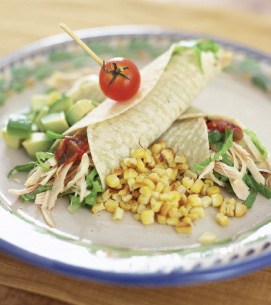
Serving lighter meals with extra vegetables helps balance your diet and fill you up.
must know
Stress eating
If you are stressed, depressed or bored, then crisps or chocolate arent going to solve the underlying problem. In fact, theyll probably make you more stressed and depressed because youve weakened your resolve; try to address whats really wrong.
Because glucose is digested in the stomach it enters the bloodstream quickly and the quantity of glucose in the blood soars. This results in a rapid rise in blood-sugar levels, sometimes called a spike. One of the problems associated with this is that it is followed by an equally swift drop, which prompts your body to boost glucose levels again, making you feel hungrier than before. The rise in blood sugar also generates a matching rise in insulin, a hormone produced by the pancreas that enables glucose to enter the bodys cells.
In recent years, with the rise in popularity of GI/GL diets, we have come to realize that its not just diabetics (who lack insulin) who need to keep blood-sugar levels steady. It is critical for your health, not just for weight loss. More and more people are developing insulin resistance syndrome, and one of the major risk factors for this is being overweight. In insulin resistance syndrome the body fails to respond to insulin properly so the pancreas produces more and more to compensate. This is not good: it has been linked to high blood pressure, type 2 diabetes (also called adult-onset diabetes), heart disease and even some cancers, so it is really worth trying to prevent it from developing in the first place.
Theres yet another reason to keep insulin levels steady: if they are fluctuating, it can inhibit the release of stored fat, which is just what you dont want when you are trying to control your weight.

Meditation reduces blood pressure, heart rate and breathing rate and is a good method of controlling stress.
Next page
